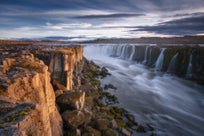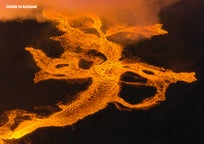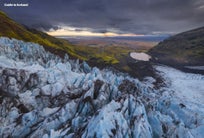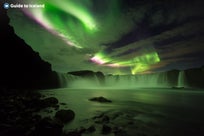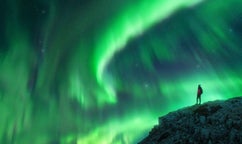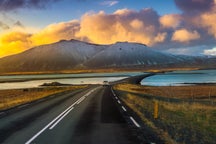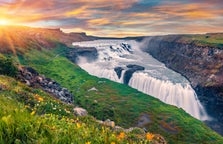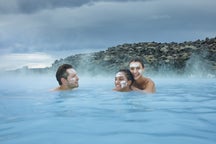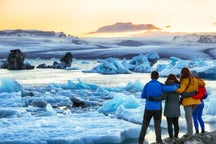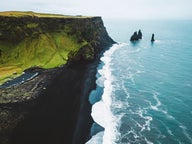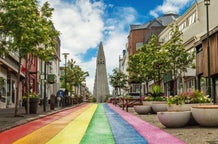
Reykjavik Parks: The Ultimate Guide
- The Top 21 Parks in Reykjavik
- Althingisgardurinn
- Arnarholl
- Austurvollur
- Einarsgardur
- Ellidaardalur
- Fossvogskirkjugardur
- Frakk-Land
- Landakotstun
- Gufunes
- Grotta
- Hallargardurinn
- Heidmork
- Hellisgerdi
- Hljomskalagardurinn
- Holavallakirkjugardur
- Klambratun
- Laugardalur
- Maedragardurinn
- Nautholsvik
- Oskjuhlid
- Styttugardurinn
- FAQ About Reykjavik Parks
- Where can you enjoy recreational activities in Reykjavik parks?
- What are the most peaceful parks in Reykjavik?
- Can I see art in Reykjavik’s parks?
- Are parks in Reykjavik suitable for families?
- Can I see the northern lights from Reykjavik’s parks?
- Are parks in Reykjavik free to enter?
- What should I know about Reykjavik parks in summer and winter?
- How do parks in Reykjavik compare to Iceland’s national parks?

What are the best Reykjavik parks? At what parks can you enjoy recreational activities, such as playing sports and going swimming? Where are the most peaceful and relaxing areas in the capital? Continue reading for a wealth of information on the top 21 parks in Reykjavik.
Iceland might be famous for its dramatic, otherworldly landscapes, like vast plains of black volcanic sand, rugged lava fields, and glaciers that stretch to the horizon. But step into Reykjavik, and you’ll find a softer, greener side to the land of fire and ice. The city’s parks are little pockets of tranquility and fun, offering a refreshing contrast to the untamed wilderness beyond.
Reykjavik’s parks are where locals and travelers alike come to unwind, breathe in some fresh Icelandic air, and reconnect with nature. They’re lush, welcoming spaces perfect for a lazy picnic, a leisurely stroll, or a game of catch with the kids. Whether you’re a nature lover, an explorer, or just someone looking for a peaceful break, these green spaces have got you covered.
From winding trails to serene hideaways, Reykjavik’s parks show off the city’s vibrant and inviting side, proof that Iceland isn’t all about rugged extremes. It’s also about finding moments of joy and connection in the simple pleasures of everyday life.
Going on a day trip from Reykjavik will tell you as much. However, you could also book a walking tour in the city of Reykjavik to see it up close and get to know its character. Take your time to stroll through the capital’s green oases and uncover why they’re as much a part of Reykjavik’s charm as its colorful houses and stunning harbor views.
The Top 21 Parks in Reykjavik
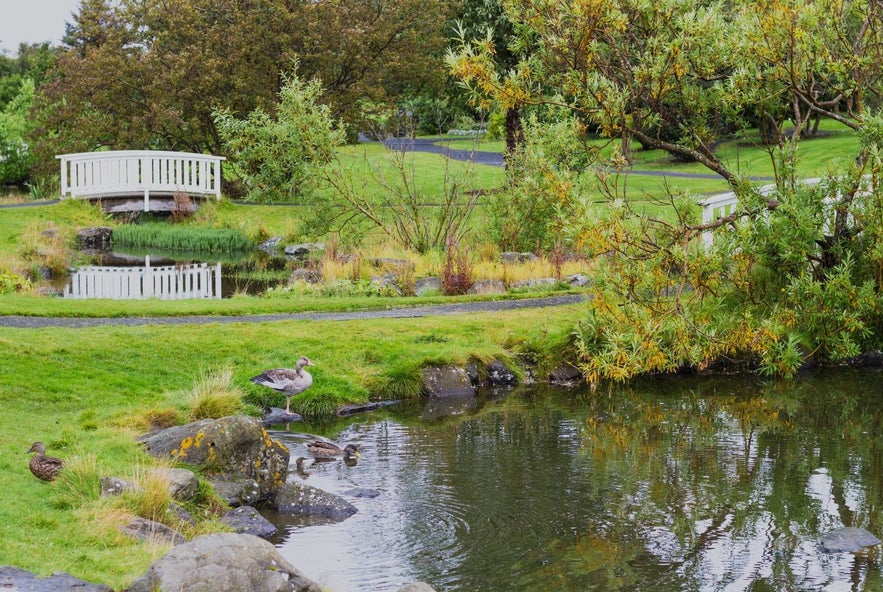
The reason for this is the wealth of serene, beautiful parks and expansive green spaces within the city. For a capital, Reykjavik is spread over a wide area, and no matter where you are, you’ll never be far from a place where you can escape the urban hustle and bustle.
If traveling with children, there are plenty of places with play areas where the young ones can run wild; those who seek quiet contemplation or a place for a romantic picnic will find a wealth of secluded spots where city living seems a thousand miles away.
Art lovers will delight in the number of statues and other pieces that are on public display throughout these recreational spaces, and those who like to stay active - whether it be by playing ball games, jogging or cycling - will be able to get their fix for fitness at a range of parks.
In summer, parks are a marvelous place to bask in the midnight sun in Iceland. In winter, meanwhile, they serve as the darkest places in the city and thus are the best places to watch the Northern Lights.
The parks in Reykjavik are often overlooked by visitors, who either prioritize getting out into the full nature and exploring places like Gullfoss waterfall on the Golden Circle, the geothermal areas at Hveragerdi, or visiting hiking trails within national parks in Iceland.
Two of the most famous National Parks are Snæfellsjökull National Park on the Snæfellsnes Peninsula in the West and Vatnajökull National Park (home to the largest glacier in Iceland) in the East of the country. Here, you can visit ice caves and explore the nearby Jokulsarlon Glacier Lagoon.
Some tour operators encourage visitors to buy a City Card and take day tours of the capital’s more renowned attractions, such as its galleries and museums. However, enjoying the parks in the city is a great way to spend some time like a local. Furthermore, all the parks in Reykjavik are free to enter, helping you save some money in this notoriously pricey city.
If you are looking to relax, exercise, get some time with the family, enjoy Icelandic art or simply take a moment away from the city, you’ll find that the parks of Downtown Reykjavik will not disappoint. Below, we have compiled a list of the 21 most notable green spaces in the city, detailing what they have that makes them unique.
Althingisgardurinn
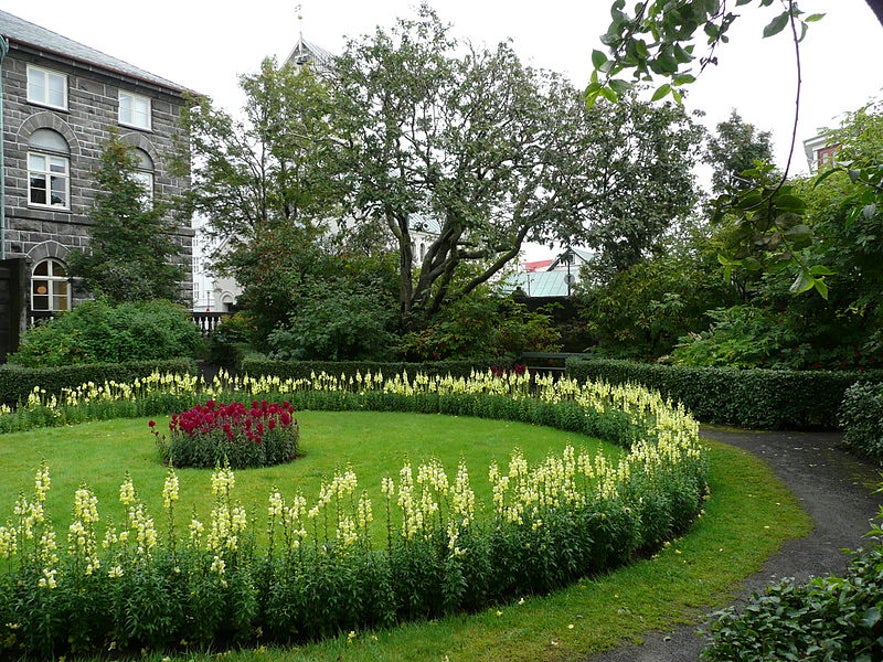 Photo from Wikimedia, Creative Commons, by Ghislain Mary. No edits were made.
Photo from Wikimedia, Creative Commons, by Ghislain Mary. No edits were made.
This list of the 21 best parks in Reykjavik begins with Althingisagardurinn, a small green space located right in the downtown area. It is named after the Althingi, or Icelandic parliament, which sits right next to it. This is the world’s longest-running assembly, having been initially formed in 930 AD in Thingvellir (Þingvellir) National Park, before moving to this location in the mid 19th Century.
In spite of its modest size, Althingisagardurinn has an ambiance of grandeur and wealth, particularly in summer, due to its beautiful and diligently maintained flower gardens. It is also home to the impressive state of Rickardur Jonsson, a famous Icelandic sculptor.
Although there are no facilities for activities at Althingisagardurinn, it is a beautiful place to enjoy a little peace, particularly considering it is right in the busy downtown area; in summer, its floral colors are delightful to the eye, whereas in winter, it becomes a miniature wonderland of snow.
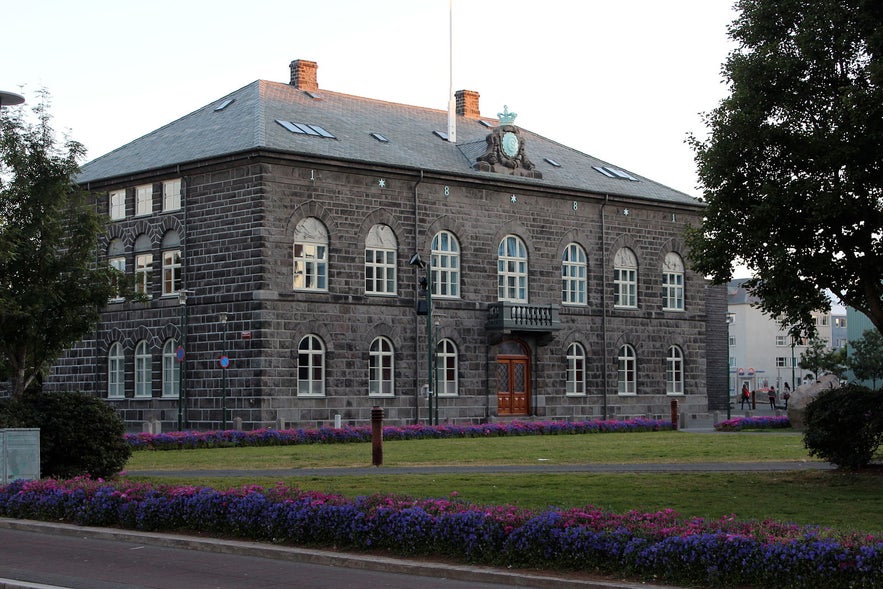
Other than bordering the parliament building, Althingisagardurinn is close to other historic sites, such as the cathedral and the oldest road in the city, Adalstraeti. It is also surrounded by some of the best bars and restaurants in town and is close to Reykjavik’s significant attractions, such as Harpa Concert Hall and the Laugavegur Shopping Street.
The roads around Althingisagardurinn are some of the busiest, and parking spaces are far between, so it is wise to park a little further away and enjoy the park as part of a walk through the downtown area.
Address: Templarasund, 101 Reykjavik
Arnarholl
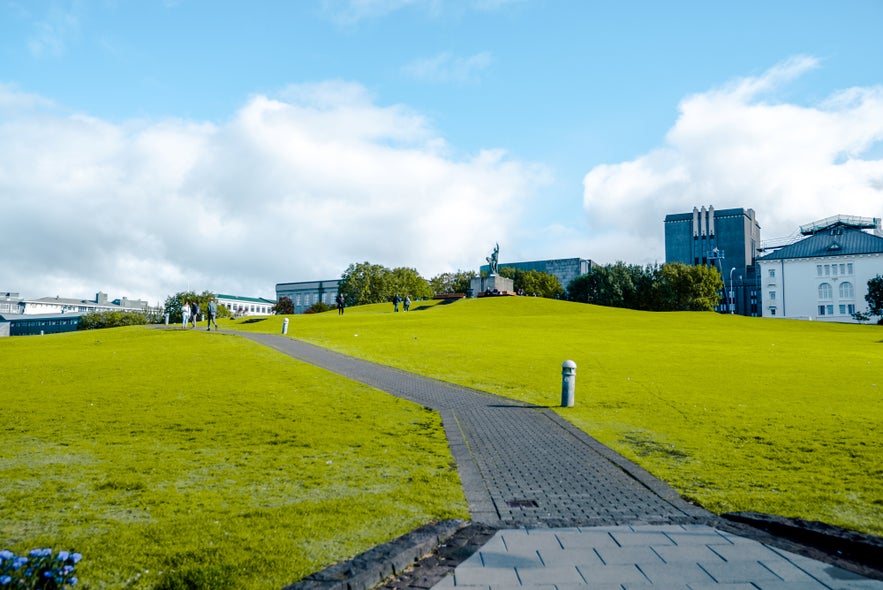 Arnarholl is a small park overlooking downtown Reykjavik and the Harpa Concert Hall, renowned for its statue of Ingolfr Arnarson, Iceland’s first settler. Situated across a steep hill, it is not an excellent space for ball games; it is, however, an excellent spot to sit and have a picnic on a clear day or to get a better view of the Northern Lights should you glimpse them when wandering the city streets on a winter night.
Arnarholl is a small park overlooking downtown Reykjavik and the Harpa Concert Hall, renowned for its statue of Ingolfr Arnarson, Iceland’s first settler. Situated across a steep hill, it is not an excellent space for ball games; it is, however, an excellent spot to sit and have a picnic on a clear day or to get a better view of the Northern Lights should you glimpse them when wandering the city streets on a winter night.
Arnarholl today is regularly used as a congregation point for essential events; over Pride, for example, the main stage faces the park so that the city’s residents can watch the show together. During significant football matches, space is also used.
Many parks in Reykjavik have interesting histories, none more than Arnarholl. The statue of Ingolfr Arnarson was erected here because many theorize that this hill was the place where he decided to settle what would become the Icelandic nation’s capital city. Allegedly, he had thrown two pillars into the ocean with the promise to make his home where they washed ashore, and this was possibly at Arnarholl.
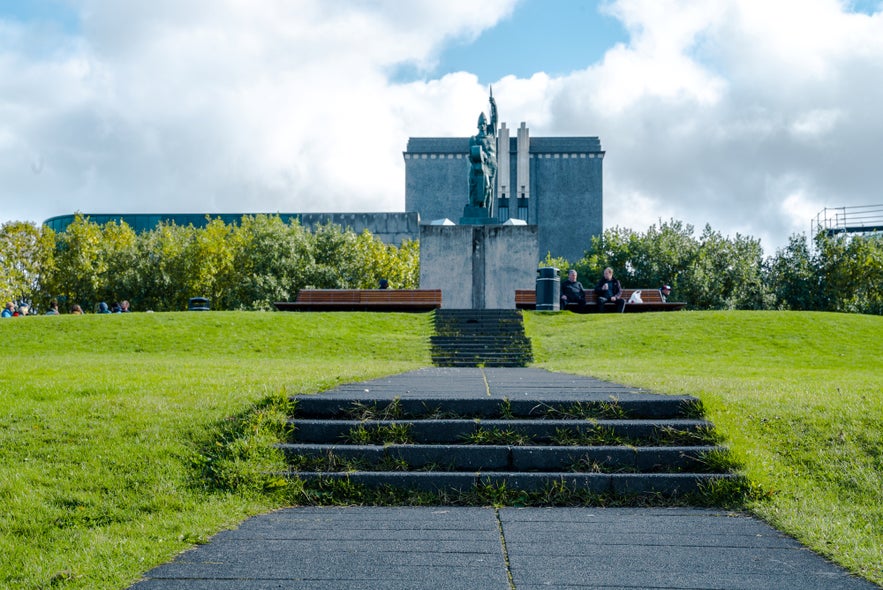 In the 19th Century, this park became central to the plans of a Danish man to spread the ideals of the French and American Revolutions across the globe. Jorgen Jorgensen, a man once described as ‘one of the most interesting human comets recorded in history,’ came to this island while Denmark was restricting the freedom of the people in their overseas territories and declared himself the King of Iceland.
In the 19th Century, this park became central to the plans of a Danish man to spread the ideals of the French and American Revolutions across the globe. Jorgen Jorgensen, a man once described as ‘one of the most interesting human comets recorded in history,’ came to this island while Denmark was restricting the freedom of the people in their overseas territories and declared himself the King of Iceland.
He used the hill to create a makeshift fort, with cannons manned by his crew. Though he managed to apprehend the governor, he was soon deposed and shortly imprisoned. Arnarholl in Reykjavik is an area with a lot of traffic but has several carparks a short walk away. It is just one street away from both the downtown area and Laugavegur.
Address: Corner of Laekjatorg and Hverfisgata, 101 Reykjavík
Austurvollur
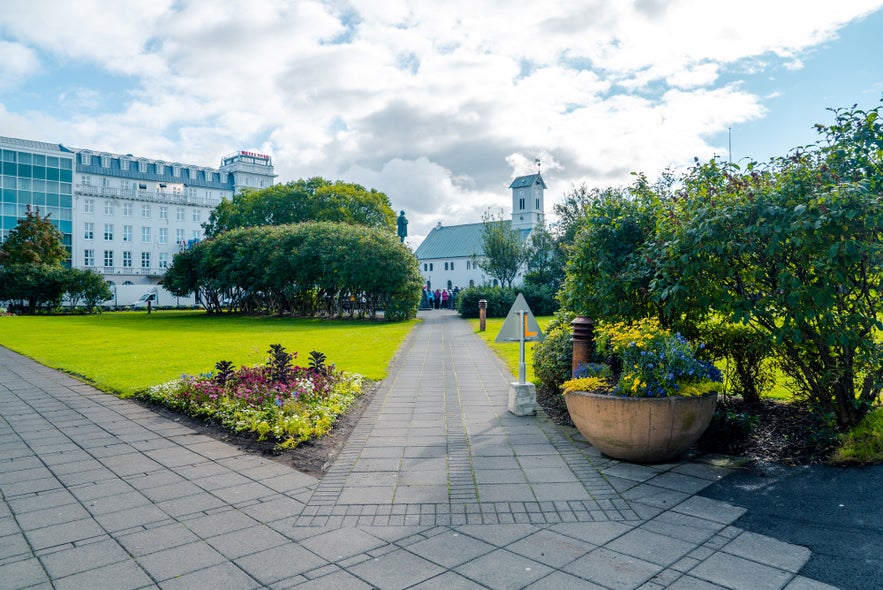 Austurvollur, like Althingisagardurinn, is located right near the Althing and cathedral in downtown Reykjavik, central to many of the capital’s major attractions. It is slightly larger, with more benches and grass areas to sit down, although still too small for most recreational activities.
Austurvollur, like Althingisagardurinn, is located right near the Althing and cathedral in downtown Reykjavik, central to many of the capital’s major attractions. It is slightly larger, with more benches and grass areas to sit down, although still too small for most recreational activities.
Central to this park is the statue of Jon Sigurdsson, one of the significant leaders of Iceland’s independence movement. Considering the history of this park, his place here is fitting; after all, it is the city’s primary protest location, where groups often gather on a large scale to exercise their democratic rights. Considering the Parliament Building looks directly upon Austurvöllur, such events send a clear message.
Some of the protests at Austurvollur have made international news as far back as 1949; when the Icelandic government committed the nation to NATO, the general public was mostly furious. In reaction, they flooded the park with direct action, which went on for years.
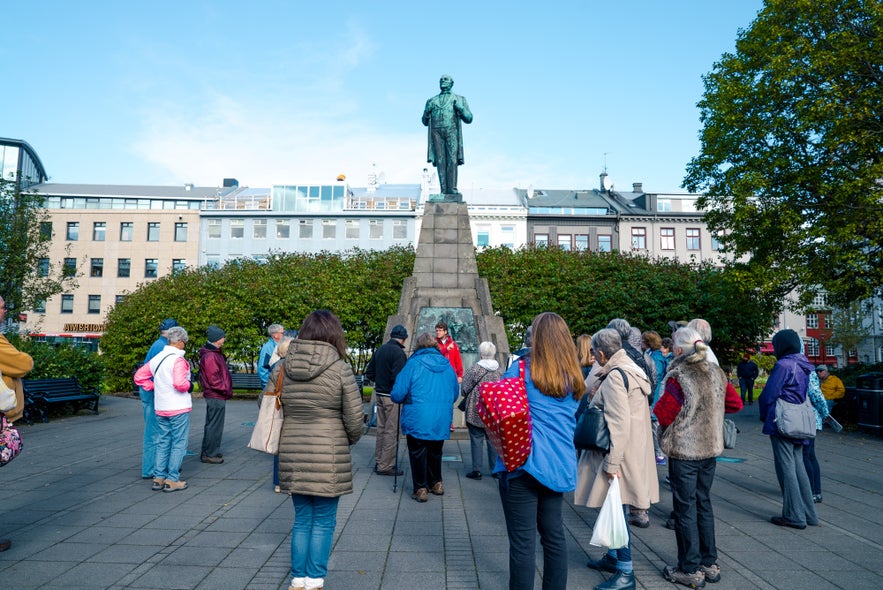 Fast forward to 2008, and the park was used as the site of the ‘Kitchenware Revolution’, where tens of thousands of Icelanders marched in winter weather, clashing pots and pans to protest their government’s role in and response to the economic recession. This direct action led to Iceland taking a very different stance from the rest of the world when it came to punishing those responsible for safeguarding the public.
Fast forward to 2008, and the park was used as the site of the ‘Kitchenware Revolution’, where tens of thousands of Icelanders marched in winter weather, clashing pots and pans to protest their government’s role in and response to the economic recession. This direct action led to Iceland taking a very different stance from the rest of the world when it came to punishing those responsible for safeguarding the public.
Austurvollur is one of the busiest parks in Reykjavik, even when people are content with the government, due to its central location and the fact that it is a crucial throughway for locals and tourists.
Address: Posthusstraeti 101, 101 Reykjavik
Einarsgardur
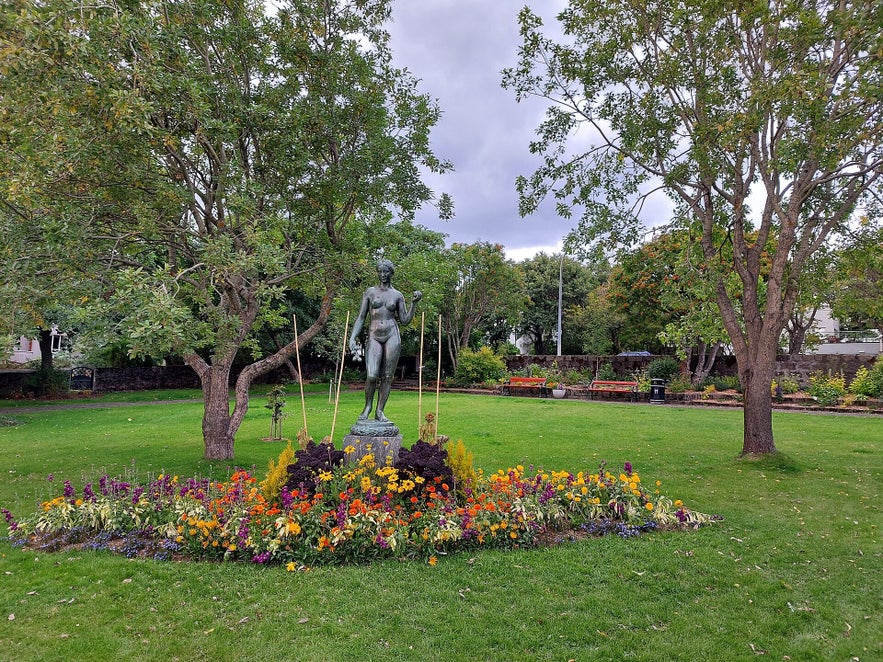
Photo from Wikimedia, Creative Commons, by SA. No edits were made.
Einarsgardur is a small park near the BSI Bus Terminal, a short walk from downtown Reykjavik; it sits opposite a historic teacher’s college. From 1899 to 1931, Einargardur was home to a greenhouse where the park’s namesake, Einar Helgason, did his pioneering work; many of the trees across the city today started their life under his care.
Today, Einargardur is a quaint place for those accessing the capital from BSI to sit and reflect at the beginning or end of a holiday. It has beautiful flower gardens in summer and sculptures by Danish artist Johannes Bjerg.
Address: Laufasvegur 79, 101 Reykjavik
Ellidaardalur
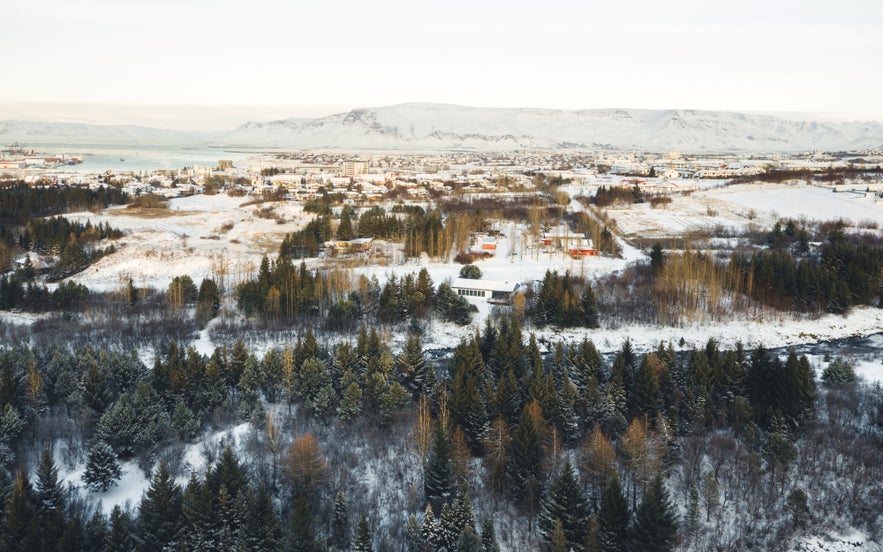 Ellidaardalur is a vast recreational area within the capital city; it’s a favorite amongst locals but primarily overlooked by visitors. Intersected by the beautiful river Ellidaa, the space is verdant and vividly colored throughout summer and spectacular when encased in ice and snow throughout the winter.
Ellidaardalur is a vast recreational area within the capital city; it’s a favorite amongst locals but primarily overlooked by visitors. Intersected by the beautiful river Ellidaa, the space is verdant and vividly colored throughout summer and spectacular when encased in ice and snow throughout the winter.
In spite of being located in the capital city, Ellidaardalur is large enough to have hiking and cycling paths. It is plenty large enough for ball games (although it should be noted that other parks have better facilities for this). Most notably, however, it is renowned for being the best recreational space in Reykjavik to go fishing.
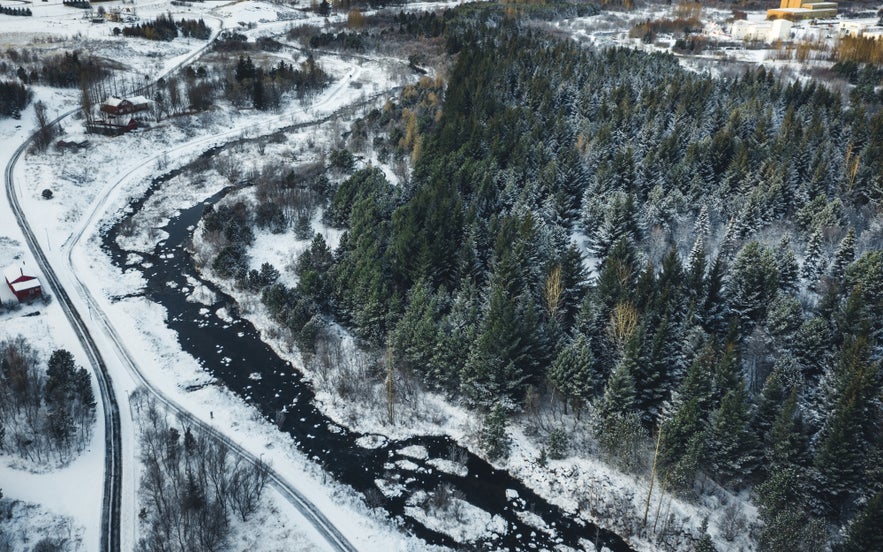 With a license, it is possible to fish here between June 1st and August 31st, after a ceremony usually led by the mayor. The most common catch in the waters here is salmon.
With a license, it is possible to fish here between June 1st and August 31st, after a ceremony usually led by the mayor. The most common catch in the waters here is salmon.
Ellidaardalur is a great place to escape to if you want to connect with nature without traveling far from the city; if staying in the downtown area, mind you will still need to drive or get a city bus to reach it, the most convenient of which will be from the Hlemmur Bus Station.
There are lots of great things to do with young children and older children in the Reykjavik area. Ellidaardalur, for example, is a great place to visit with children, mainly because it is home to many rabbits they will surely delight in seeing.
Address: 109 Reykjavik
Fossvogskirkjugardur
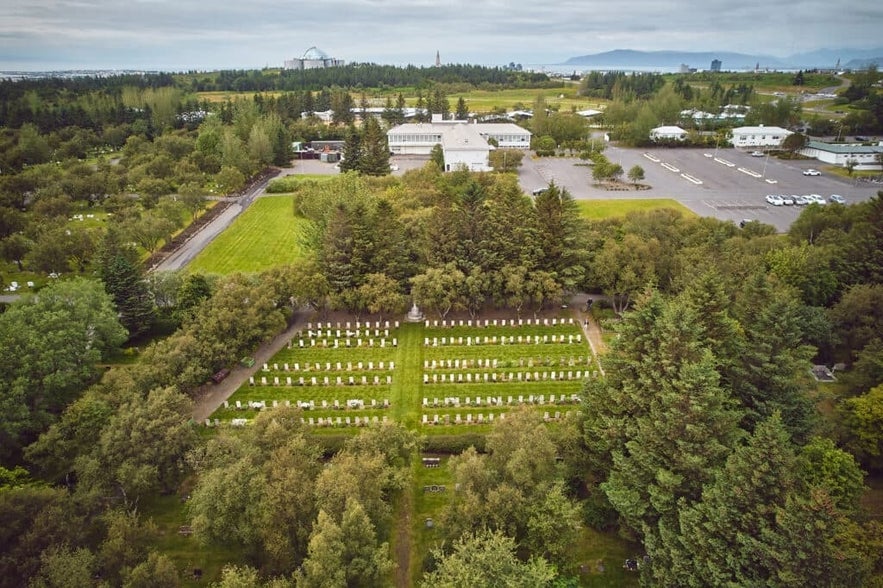 Photo from Photo from Kirkjugardar. No edits were made.
Photo from Photo from Kirkjugardar. No edits were made.
Fossvogskirkjugardur is a large park in the Fossvogur district of Reykjavik, a short walk or bus journey from the downtown area. Unlike most of the other parks on this list, Fossvogskirkjugardur is not a place of recreation, particularly, but a cemetery.
More specifically, it is a World War Two Cemetery; 199 Commonwealth soldiers, eight Norwegians, and one Russian are all remembered here, as are eight others who were not involved in the military. Though Iceland did not see any combat in the war, they were invaded by Allied troops after Germany took Denmark, both to protect the people and to prevent the Nazis from claiming such a strategic point in the North Atlantic.
The area surrounding Fossvogskirkjugardur has several relics from this era, with old lookout points in the surrounding forest. This peaceful woodland is called Oskjuhlid and is discussed in more detail below.
Though a place for somber reflection, the park is still beautiful, with a river and a small waterfall. It is, however, only open on weekdays between 08:30 and 16:30. There are car parks on the site, which can also be used to explore the forest and its nearby beach (also discussed below).
Address: Faxaskjol 6, 105 Reykjavik
Frakk-Land
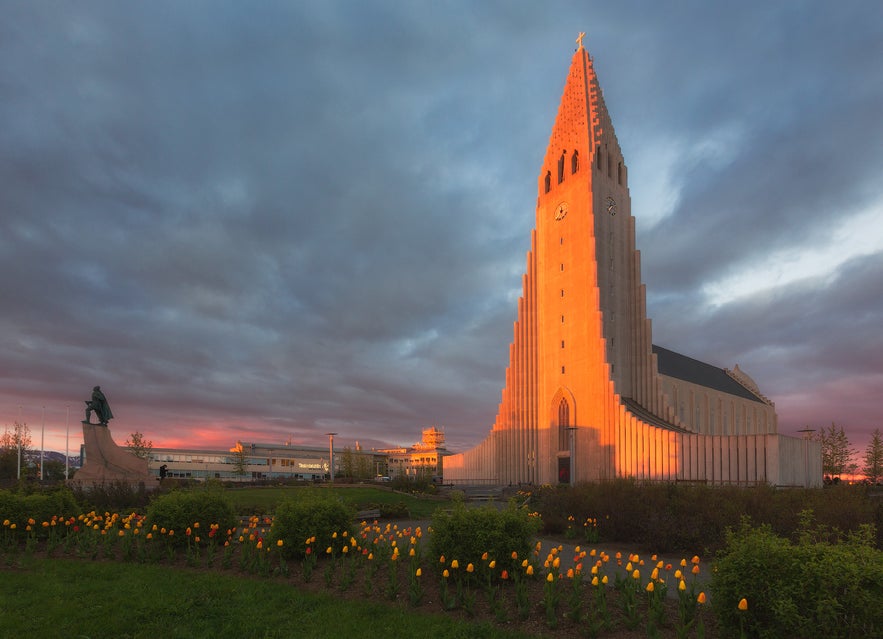 Frakkland is a tiny park located next to Reykjavik’s most iconic landmark, the church of Hallgrimskirkja. This pleasant green space has several benches, making it a quaint spot for a picnic or to catch your breath after climbing the hill to the church. The area surrounding it is full of life, with many nearby boutiques, restaurants, and cafes.
Frakkland is a tiny park located next to Reykjavik’s most iconic landmark, the church of Hallgrimskirkja. This pleasant green space has several benches, making it a quaint spot for a picnic or to catch your breath after climbing the hill to the church. The area surrounding it is full of life, with many nearby boutiques, restaurants, and cafes.
Frakkland becomes very busy on New Year's Eve when it is one of the prime viewing spots for watching the spectacular fireworks show that occurs across the city. Thousands of people set off dozens of fireworks, turning the midnight sky into a kaleidoscope of color for hours, and the view from around Hallgrímskirkja is one of the best.
Address: Frakkastigur, 101 Reykjavik
Landakotstun
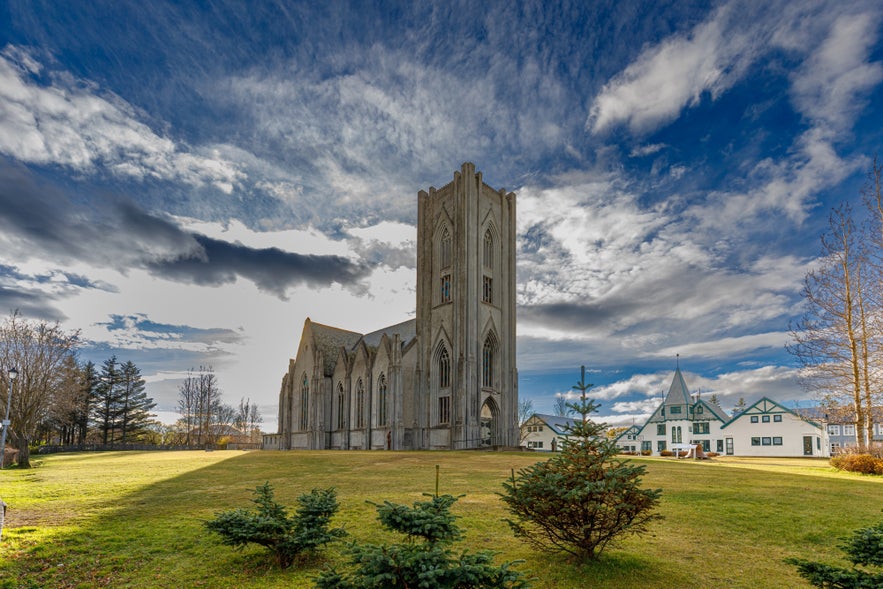 Spacious, quiet and only a short walk from the downtown area, Landakotstun is a delightful park in a residential area which you can easily escape to for a little peace from the tourists. Located before the beautifully designed Landakotskirkju church, the park presents a serene face of Reykjavik that many visitors will not see.
Spacious, quiet and only a short walk from the downtown area, Landakotstun is a delightful park in a residential area which you can easily escape to for a little peace from the tourists. Located before the beautifully designed Landakotskirkju church, the park presents a serene face of Reykjavik that many visitors will not see.
Because of its reasonable size, ball games and other recreational activities can be enjoyed at Landakotstun, although there are no facilities such as football courts or play parks for the little ones. Reaching Landakotstun requires you to walk away from many of the major attractions, although it is only a short distance and its ‘isolation’ makes it all the more peaceful.
Address: Tungata 13, 101 Reykjavik
Gufunes
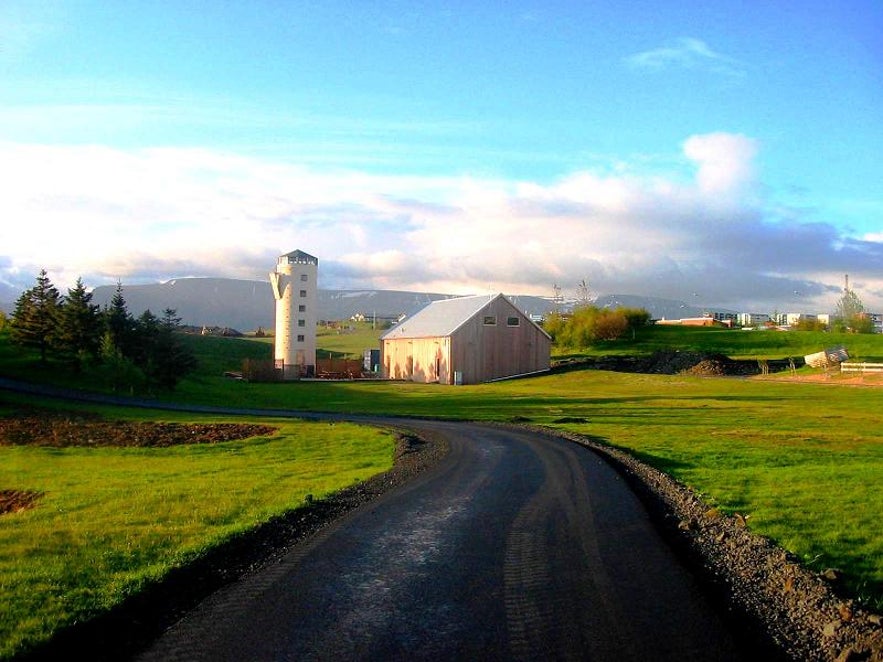 Photo from Wikimedia, Creative Commons, by Roman Z. No edits made.
Photo from Wikimedia, Creative Commons, by Roman Z. No edits made.
Gufunes was once a historical estate and now offers a space with something for everyone.
After exploring all the art museums and galleries in Reykjavik, lovers of art, culture and history will appreciate that the park has 25 sculptures by renowned Icelandic artist, Hallsteinn Sigurdsson. Hallsteinn is famous for his depictions of the Old Norse Gods. However, there are also pieces on display that were created by other artists. Throughout the City of Reykjavik, it’s possible to see sculptures of famous Icelanders in history.
Those who enjoy exercise will find plenty of space to jog, and groups are welcome to partake in games such as football and handball.
Nature enthusiasts, meanwhile, will appreciate the fact it has its own harbor with stunning sea views, which look out over the serene Vídey Island. The size of the space and its remoteness from the rest of the city also make it a beautiful place to have a date or to enjoy some alone time.
Located in northeast Reykjavik, Gufunes is best reached by car or bus. Though its surroundings are beautiful, there are no major attractions around the park. Whilst this means that it will require a dedicated visit, it also carries the promise that there will be far fewer tourist crowds than at many of the capital’s other recreational spaces.
Address: Gufunesvegur, 112 Reykjavik
Grotta
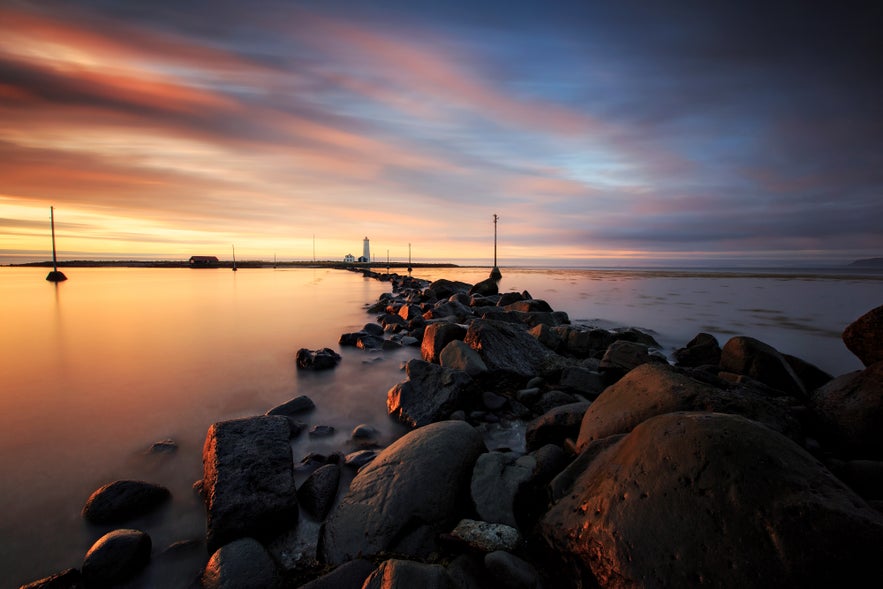 Grotta is one of the most beautiful parts of Reykjavik. A dedicated nature reserve since 1974, it is located on the tip of the Seltjarnarnes Peninsula and most renowned for its birdlife, its stunning sea views and its lighthouse, which has stood on the site since 1897.
Grotta is one of the most beautiful parts of Reykjavik. A dedicated nature reserve since 1974, it is located on the tip of the Seltjarnarnes Peninsula and most renowned for its birdlife, its stunning sea views and its lighthouse, which has stood on the site since 1897.
In terms of birds in Iceland, Grotta Island and its accompanying Lighthouse are best known for being a nesting site for Arctic Terns in summer. Though beautiful, these animals are notorious for the defensive behavior they display when defending their eggs, dive-bombing the heads of any who get close. As such, it’s essential to stick to the hiking and biking paths that run throughout the reserve.
Throughout the summer, it is possible to surf at Grotta, though this is only recommended for the experienced, as the waters of the North Atlantic are icy throughout the year.
In winter, Grotta is a fantastic place to observe the Northern Lights whenever it is clear-skied and dark enough; the only light pollution comes from the lighthouse. There is a small, little-known geothermal pool where you can bathe your feet as you look out for a spectacular display of the aurora.
If you would like to swim, there is a swimming pool very close to Grotta, as well as a golf course. Grótta Island is also a historic site, having been inhabited since the 16th Century.
Address: Norðurstrond, Seltjarnarnes
Hallargardurinn
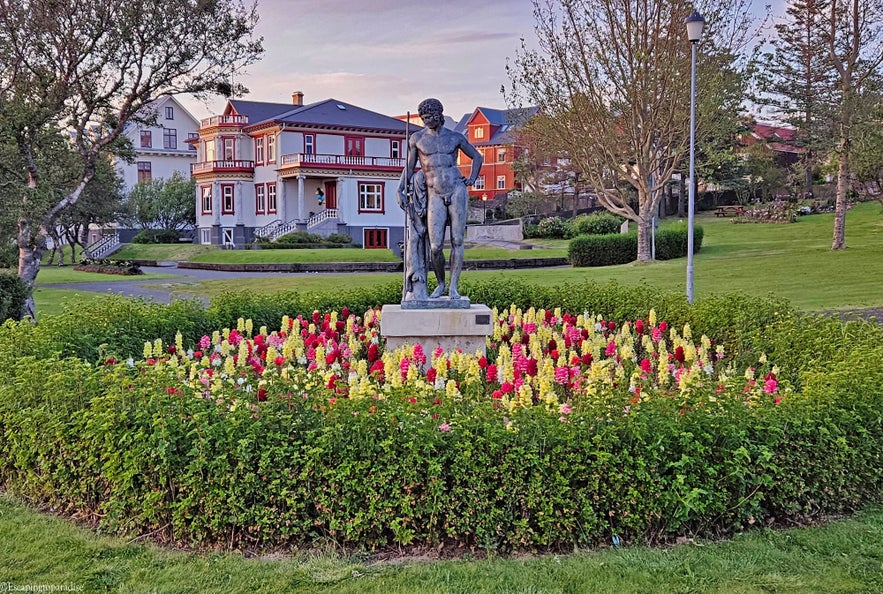
Photo from Flickr, by nickp_63. No edits were made.
Hallargardurinn is one of several parks located around Tjornin, the pond located in central Reykjavik. It is a convenient and cheerful place to relax while sightseeing around the capital. Unlike several of the other parks in the downtown area, there is space here for ball games and group activities.
Built between 1953 and 1954, Hallargardurinn is situated next to the historic Reykjavik Women’s College. It is also adjacent to the National Gallery of Iceland, the number one spot in the country to admire the incredible art produced by Icelanders, and the Office of the President of Iceland. Just across the lake from it is City Hall, and behind that, all of the sites of the downtown area.
Address: Frikirkjuvegur, 101 Reykjavik
Heidmork
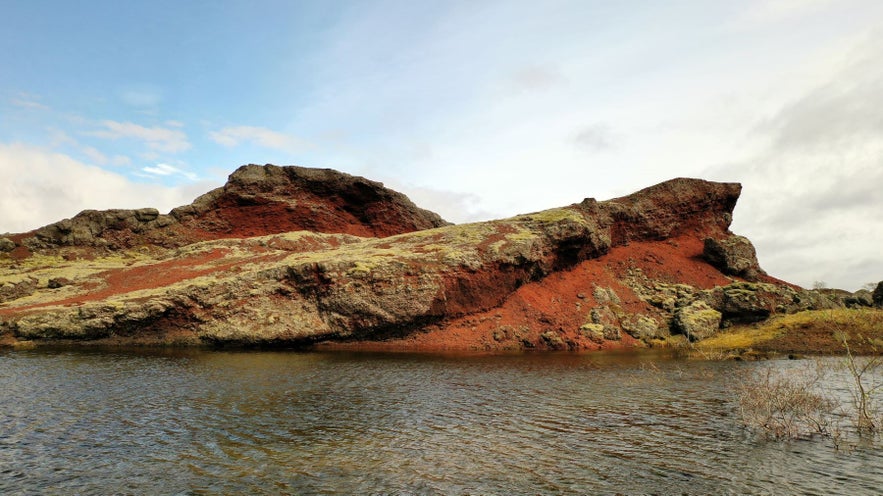 Heidmork is a vast, spectacular conservation area just outside of Reykjavik and one of the favorite places amongst locals to spend a day out. Established in 1950, it now spans over 3,000 hectares and is filled with woodlands, wildlife, and spectacular geography. It’s a fantastic place to explore the flora of Iceland.
Heidmork is a vast, spectacular conservation area just outside of Reykjavik and one of the favorite places amongst locals to spend a day out. Established in 1950, it now spans over 3,000 hectares and is filled with woodlands, wildlife, and spectacular geography. It’s a fantastic place to explore the flora of Iceland.
Reforestation efforts have proved incredibly useful at Hallargardurinn, Heidmork. There are 26 species of tree and nearly 200 variations of wildflowers that flourish here. In these trees and at the bordering Ellidvatn Lake, over 60 species of bird have been identified.
As such, a hike or bike ride along the trails here is particularly unique, with far more colorful and vibrant nature than can be found throughout much of the rest of Iceland. In the serene waters of the lake in summer, you can also go salmon fishing, though you need a license.
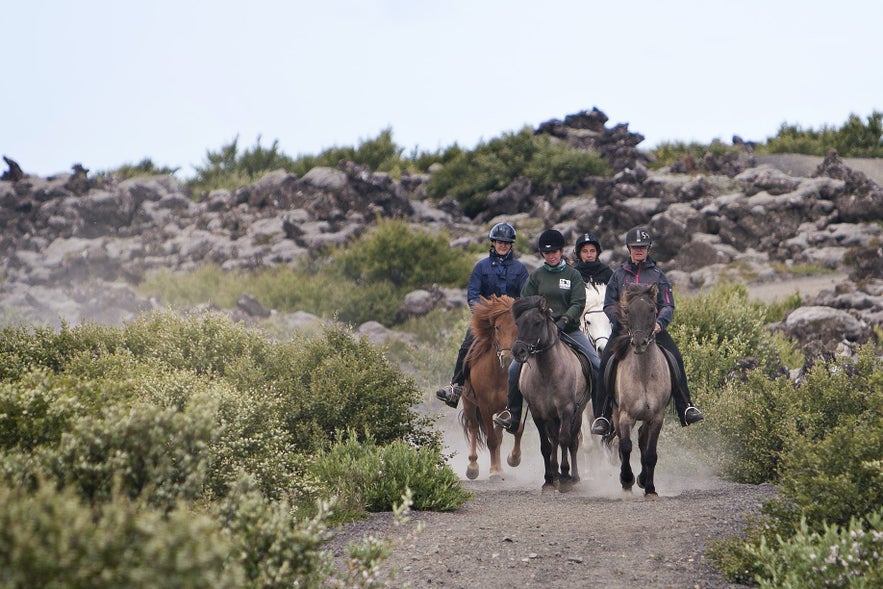 Photo from Scenic 5-Hour Viking Express Horseback Tour of Heidmork with Transfer from Reykjavik
Photo from Scenic 5-Hour Viking Express Horseback Tour of Heidmork with Transfer from Reykjavik
Even the landscapes at Heidmork are colorful. The area is renowned for being home to the ‘Red Hills’, or Raudholar, which are dyed crimson due to the iron deposits in the earth. Amongst these cliffs are the remains of craters that were part of an eruption that dramatically changed this landscape 5,200 years ago. Throughout World War Two, these craters were partially damaged when their rocks were used for gravel inroads, although they are now protected.
You will need to get a car, where you will find plentiful parking, or else you can take a city bus. If driving yourself, Heidmork is a great first stop on a sightseeing journey either along the spectacular South Coast or the Golden Circle, the two most popular routes in the country.
Address: Heidmerkurvegur, Kopavogur
Hellisgerdi
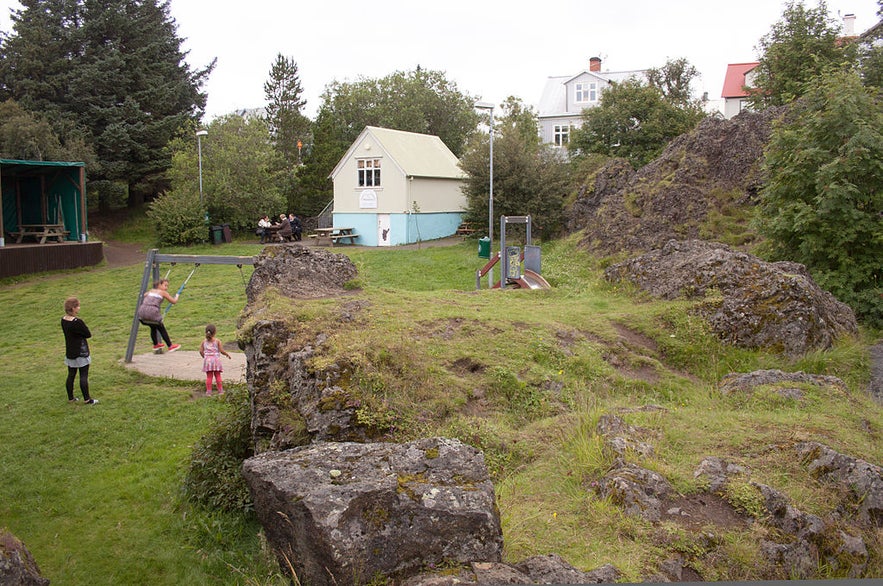 Hellisgerdi park is a beautiful, small park in Hafnarfjordur, one of the towns just on the outskirts of Reykjavik considered part of the Greater Reykjavik Area. You will need to drive or take a city bus to reach it unless staying at a hotel in Hafnarfjordur or a nearby bungalow.
Hellisgerdi park is a beautiful, small park in Hafnarfjordur, one of the towns just on the outskirts of Reykjavik considered part of the Greater Reykjavik Area. You will need to drive or take a city bus to reach it unless staying at a hotel in Hafnarfjordur or a nearby bungalow.
Hafnarfjordur translates to ‘the Town in the Lava’, but it is better known to tourists by its nickname, ‘the Town of Elves’. The people of this settlement remain more superstitious than many other Icelanders, with many rocks and hillocks in their neighboured still believed to have Hidden Elves, several of which are in Hellisgerdi.
The elves are part of Iceland’s rich folklore, said to live in an adjacent mystical world, rewarding those who please them and cursing those who they consider immoral or evil.
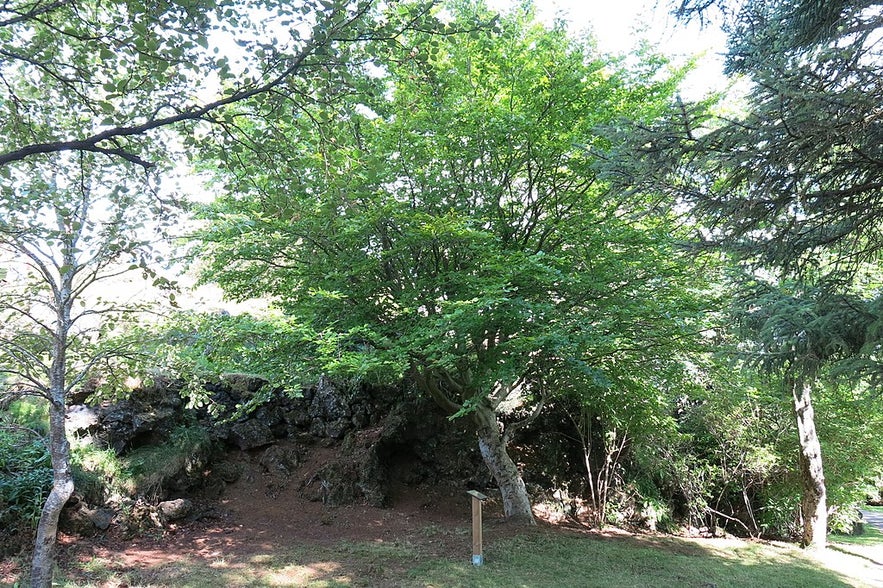 Though many doubt the truth of such mystics, it is easy to become woven into their stories when surrounded by such beauty. Hellisgerdi has many trees, a small waterfall, a serene pond, and several small caves, giving it an air of the fantastical.
Though many doubt the truth of such mystics, it is easy to become woven into their stories when surrounded by such beauty. Hellisgerdi has many trees, a small waterfall, a serene pond, and several small caves, giving it an air of the fantastical.
There are plenty of options to book a caving tour in Iceland. For example, you can book a tour of the Leidarendi Cave, which departs from Reykjavik. Here, you can take in and enjoy its fascinating depths.
There is an elf shop nearby where you can buy souvenirs that remind you of this nation’s unusual but fascinating traditions. If making a special visit to Hellisgerdi, it is worthwhile also to explore the other sights of Hafnarfjordur.
The town has a beautiful harbour, a museum with many cultural artefacts and hosts an annual Viking Festival. It is also surrounded by spectacular lava fields, and close to the many sites of the Reykjanes Peninsula.
Address: Hellisgata, Hafnarfjordur
Hljomskalagardurinn
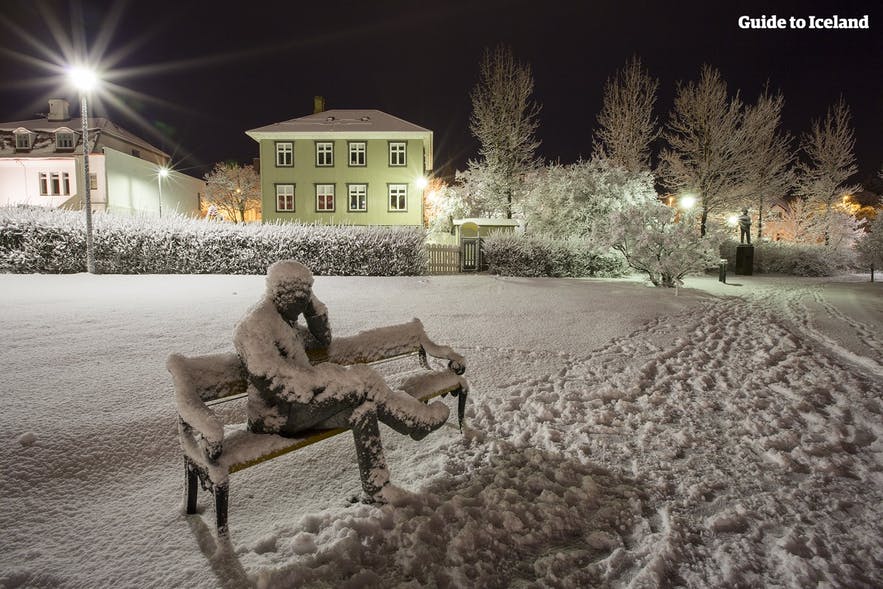
Hljomskalagardurinn is another park located right beside the central downtown lake of Tjornin. It is the largest, and one of the best parks in Reykjavik for kids; after all, it has a rope pyramid, sandbox and a trampoline.
There is also a field for sports and barbeque facilities should the weather be bright enough to make the most of them. In short, it is the perfect park for families and groups of friends to relax for a few hours, made all the more perfect by its proximity to the city’s significant sites. Do note, however, that in spite of its decent size, this is one of the busiest parks in the city.
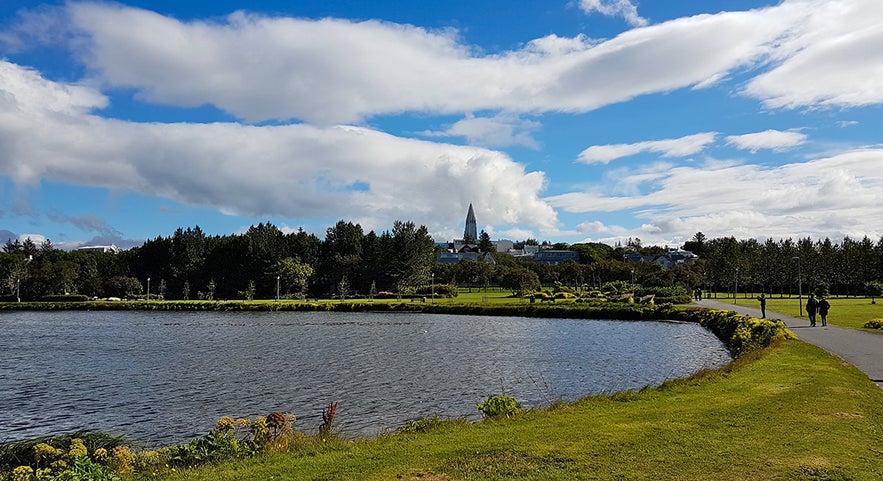 Even so, those who are seeking serenity and culture will find something for them at Hljomskalagardurinn. It has, for example, fifty beautiful cherry trees spread around it, which are stunning in full bloom, as well as an array of statues. These were almost all created by female artists, five of whom hailed from Iceland and one of whom is Danish.
Even so, those who are seeking serenity and culture will find something for them at Hljomskalagardurinn. It has, for example, fifty beautiful cherry trees spread around it, which are stunning in full bloom, as well as an array of statues. These were almost all created by female artists, five of whom hailed from Iceland and one of whom is Danish.
The most notable statue on site is of Tómas Gudmundsson, a poet most famed for making Reykjavik a central theme in his work. This motif has continued throughout Iceland’s culture since, with many works across different mediums focused on life in the city, and the town itself.
Address: Frikirkjuvegur, 101 Reykjavik
Holavallakirkjugardur
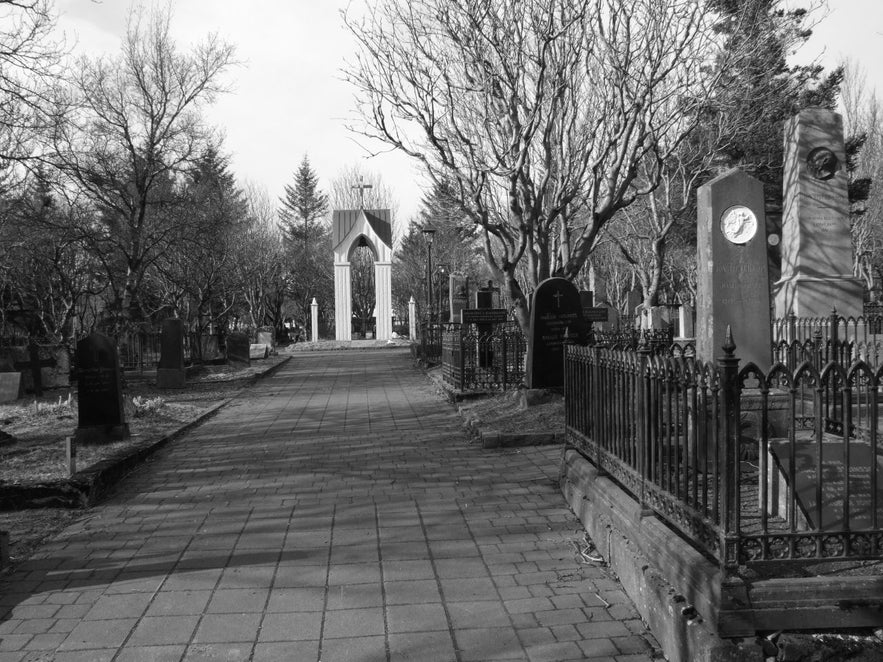 Photo from Flickr, photo by kklinnet. No edits were made.
Photo from Flickr, photo by kklinnet. No edits were made.
Holavallakirkjugardur is another small park by Tjornin in downtown Reykjavik, although quite different in its atmosphere than Hljomskalagardurinn. While the latter is bright, cheerful, and busy, Holavallakirkjugardur is much more somber, primarily due to the 19th-century cemetery on site.
This cemetery is particularly notable for its historical value; many of the tombstones had iron crosses, which were primarily melted down in the early 20th Century across the rest of Europe, making them rare features.
Holavallakirkjugardur, in spite of its sober ambiance, remains a lovely place for some silent contemplation and a gentle stroll in summer; this is primarily due to the fact that the graves are enclosed in woodland and often adorned with bright flowers.
The park in winter, however, does develop an air of creepiness with the cold iron, ice, snow, and bare trees, creating quite a chilling scene.
Address: Ljosvallagata, 101 Reykjavik
Klambratun
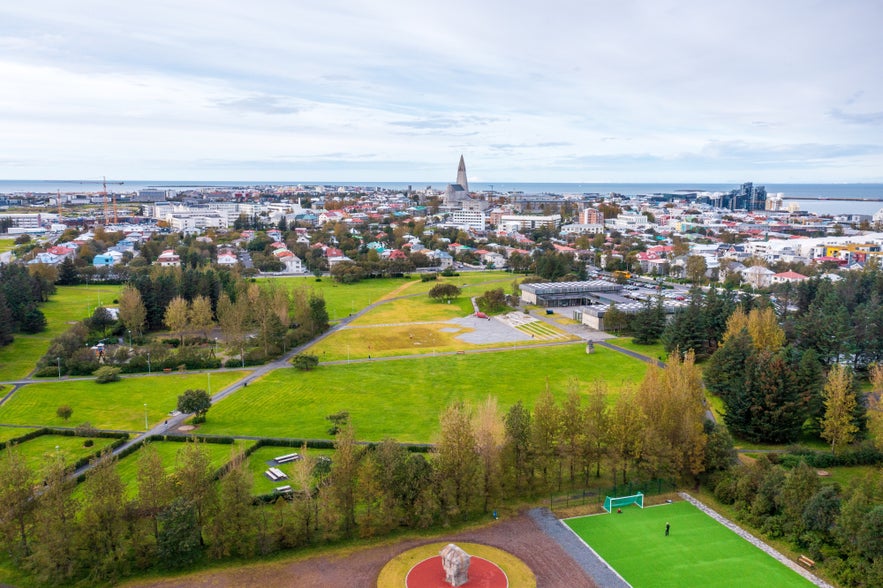 Though Klambratun park in Reykjavik is a little walk from the downtown area, it remains one of the city’s most popular parks, particularly for locals, due to its residential setting, its large size and its broad range of facilities.
Though Klambratun park in Reykjavik is a little walk from the downtown area, it remains one of the city’s most popular parks, particularly for locals, due to its residential setting, its large size and its broad range of facilities.
Once again, it is an excellent destination for families, with a children’s playground on-site; furthermore, it has courts for basketball, football, and even ultimate frisbee and vast amounts of space for other activities. Groups of Icelandic children are regularly seen in the park throughout summer, competing in both conventional sports and more out-there group activities.
In the center of Klambratun park is the Kjarvalsstadir Art Museum, which is full of pieces by one of the country’s most beloved painters and sculptors, Johannes Kjarval. The museum also has a cafe on-site, so parents can relax while the kids play safely outside.
The only drawbacks of this park are that it is not close to any major attractions in the capital and that it can get quite busy. In spite of this, it is still an easy walk from the downtown area or Hlemmur Bus Station and quieter than Arnarholl and Hljomskalagardurinn. Furthermore, the roads and parking as less congested surrounding Klambratun.
Address: Austurstraeti 4, 101 Reykjavik
Laugardalur
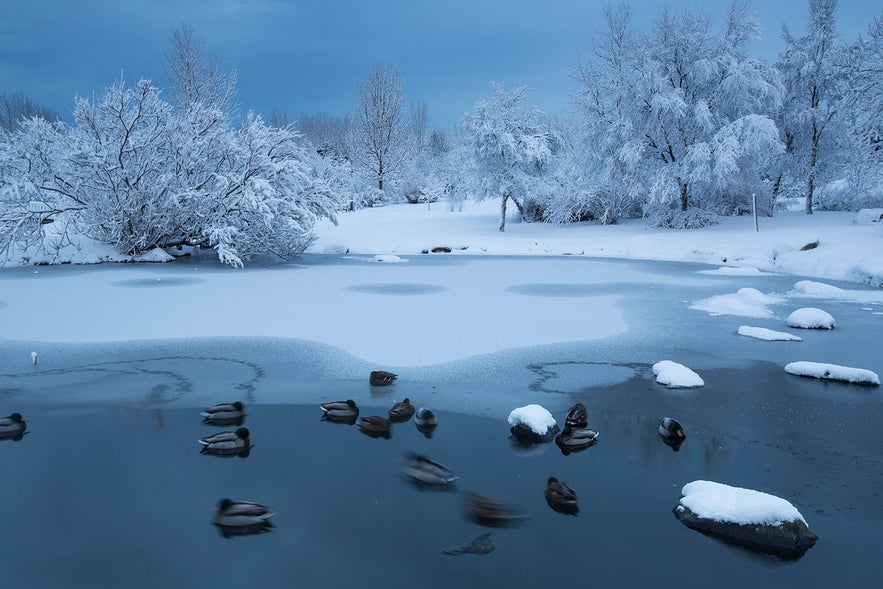 Laugardalur is the biggest park in Iceland, located just half an hour’s walk from the capital; in its center, you would never know that you were in a capital city. It is best known for its adjoining swimming pool, Laugardalslaug, which is also the largest of its kind in the country; the feature has several waterslides, hot tubs, spa facilities, and a massive, modern adjacent gym.
Laugardalur is the biggest park in Iceland, located just half an hour’s walk from the capital; in its center, you would never know that you were in a capital city. It is best known for its adjoining swimming pool, Laugardalslaug, which is also the largest of its kind in the country; the feature has several waterslides, hot tubs, spa facilities, and a massive, modern adjacent gym.
The park, however, has far more attractions, appealing to a wide range of travelers. Those who want to engage in or watch sporting activities will find a vast stadium, many courts for a variety of games, and endless fields of grass to make the most of. Those who enjoy hiking could easily spend over an hour following the many routes from the park and keep discovering new sections.
Laugardalslaug is so large that it often hosts some of the country’s biggest festivals and events. Its expansive campsite, which is open throughout summer, becomes full of music lovers eager to see their favorite acts.
If you have an interest in flora, there is a beautiful botanical garden with a surprisingly diverse range of colourful specimens. If you prefer animals, then there is even the Family Park and Zoo, space where you can meet Icelandic animals from its livestock to its Arctic Foxes, its reindeer to its seals.
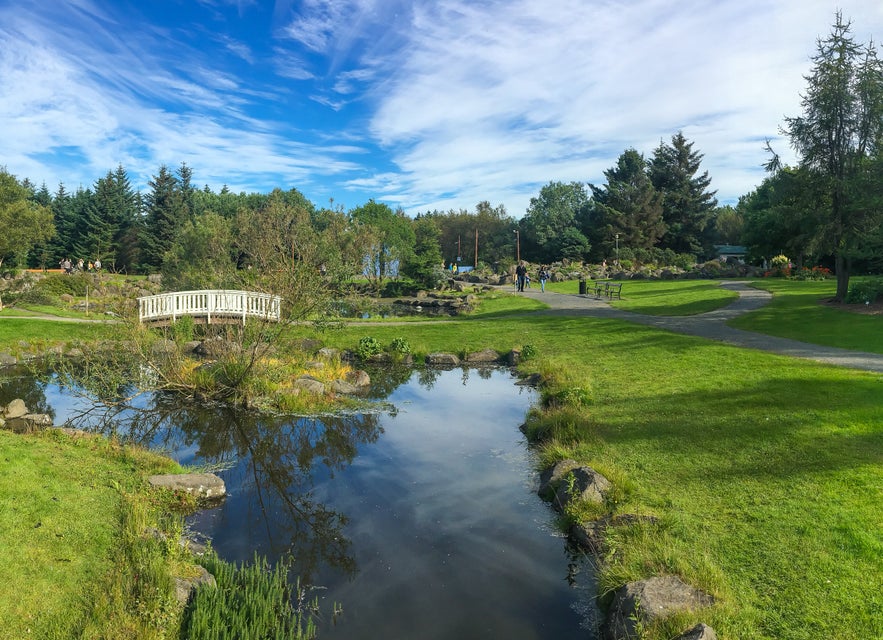 This is a favorite attraction amongst children, who will also enjoy the modest rides, such as a carousel, on-site.
This is a favorite attraction amongst children, who will also enjoy the modest rides, such as a carousel, on-site.
Laugardalur also has an art museum, Ásmundarsafn, which showcases the works of Ásmundur Sveinsson. Even if you don’t want to explore the galleries, the buildings themselves are beautiful feats of Icelandic architecture.
This park has an exciting role in the history of Iceland. The hot springs here, which are now channeled into the swimming pools, were the reason that Reykjavik was given its name, which literally translates to Smoky Bay.
Parts of Laugardalur are regularly busy, particularly during festivals or sporting events, but the space is so vast that you will always be able to escape the crowds. It is possible to park in many places around the park, the most convenient being outside the pool and gym.
Address: Engjavegur, 101 Reykjavik
Maedragardurinn
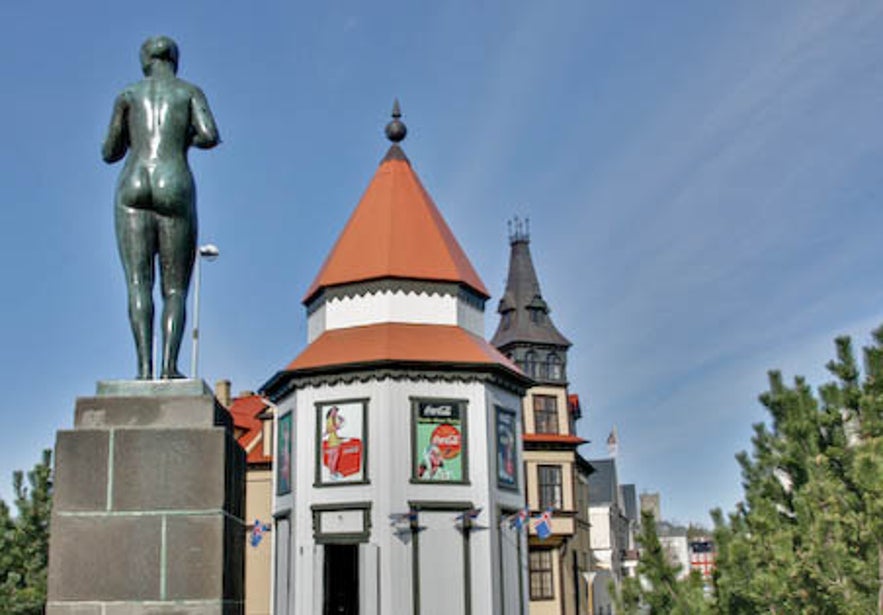 Photo from Flickr, photo by Thorhallur Maack. No edits were made.
Photo from Flickr, photo by Thorhallur Maack. No edits were made.
Maedragardurinn is a minuscule green space in central Reykjavik, just off the road Laekjatorg, which borders the downtown area.
It was initially established in 1925 as a dedicated park for mothers and their children and fittingly was granted with a statue of a maternal figure, named ‘Mother Love’, in 1928. This statue was one of its kind that was erected purely as a statement of public art. All other icons and sculptures on display are monuments of historical figures.
Adjacent to the park is an old electric transformer that dates back to 1921, which provides a little window into what the city looked like during this period.
Due to the importance of Laekjatorg for Reykjavik traffic, the road was widened in 1950, taking a considerable swathe of the park with it. Now, it is just a little corner of greenery surrounding ‘Mother Love,’ lovely for a sit-down but unsuitable for activities that take up more space than a picnic.
Address: Laekjatorg, 101 Reykjavik
Nautholsvik
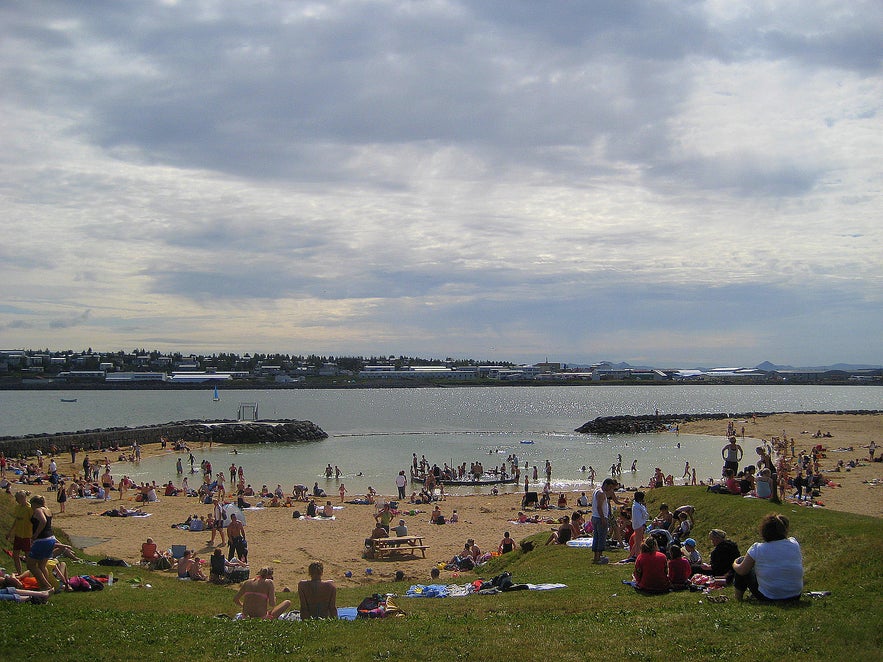 Photo from Wikimedia, Creative Commons, by Helgi Halldórsson. No edits were made.
Photo from Wikimedia, Creative Commons, by Helgi Halldórsson. No edits were made.
Nautholsvík is perhaps the most unique ‘park’ on this list. Rather than being a space of greenery, it is considered one of the most beautiful beaches in Iceland. Here, it is possible to swim and engage in a range of other summer activities.
While swimming in North Atlantic seas hardly sounds inviting, geothermal water is pumped just off the shoreline at Nautholsvík, warming the swimming area to make it as comfortable as possible. If you want to take the dip, however, be sure to check that the heating system is running, as it only operates during the middle of the day and only then in summer.
Other than the sea, guests can entertain themselves in the hot pools, volleyball court, and barbeque area; the beach is also perfect for sunbathing and for kids to build sandcastles.
Those interested in getting out on the water will find a Sailing Club nearby, where they can inquire about watersports on offer at the time. Nautholsvík has bathrooms, changing areas, and a service center for your convenience.
Nautholsvik is adjacent to the forested woodland of Oskjuhlid, detailed below, and thus just over half an hour’s walk from the center of town; many buses run here, however, and there is a large car park that only nears capacity on a particularly gorgeous day.
Address: Nautholsvegur, 101 Reykjavik
Oskjuhlid
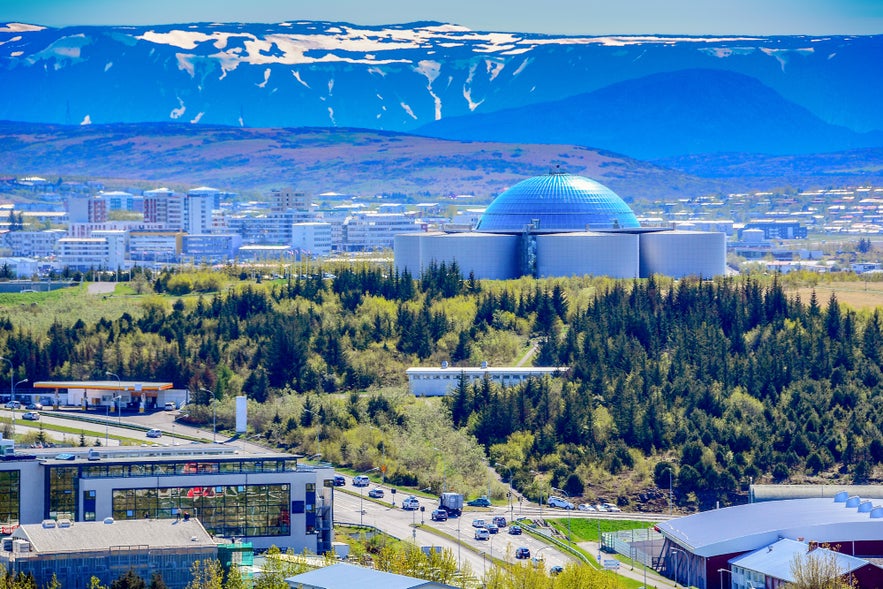 The final addition to this list of the best parks in Reykjavik is the woodland of Oskjuhlid. Set over the hill, it is the largest forest in the capital area, and unlike other forests around the country, composed entirely of imported pine trees, making it green throughout the year.
The final addition to this list of the best parks in Reykjavik is the woodland of Oskjuhlid. Set over the hill, it is the largest forest in the capital area, and unlike other forests around the country, composed entirely of imported pine trees, making it green throughout the year.
The forest itself has many hiking and biking paths and is very popular amongst locals in good weather, particularly those with dogs. Several of these trails lead to the aforementioned Fossvogurinn cemetery and Nauthólsvík Geothermal Beach. Some also lead to relics left by the Allied Forces after World War One, including look-out points and even some old (and thankfully never used) guns.
At the top of the hill of Oskjuhlid is one of the most iconic landmarks of the capital city, Perlan (‘The Pearl’). This dome-shaped building is renowned for its viewing point and the fascinating museum within, which hosts ever-changing and growing exhibitions on Icelandic natural phenomena, such as its glaciers, Northern Lights, and wildlife. There is a restaurant, cafe, and gift shop within.
Oskjuhlid is very large, but due to the narrow paths and many trees, it is not great for sports; even so, there are several fields surrounding it in which you can enjoy such activities.
Perhaps more than any park in Reykjavik, it provides an escape from all the hustle and bustle of the city; it is the perfect example of how you can be enveloped in a peaceful place of beautiful nature without leaving the capital.
Address: Bustadavegur, 101 Reykjavik
Styttugardurinn
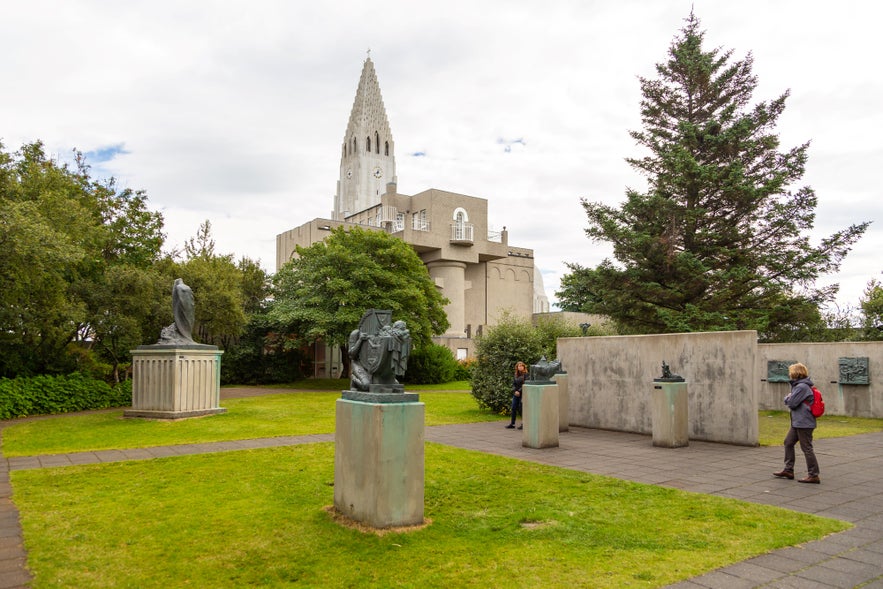 Styttugardurinn is the sculpture garden of the Einar Jonsson Sculpture Museum, located right beside the iconic Hallgrímskirkja church. This is a favorite space for many Icelanders who revere the work of the museum’s namesake, Einar. He completely changed the arts within the country and is renowned for his incredible attention to detail.
Styttugardurinn is the sculpture garden of the Einar Jonsson Sculpture Museum, located right beside the iconic Hallgrímskirkja church. This is a favorite space for many Icelanders who revere the work of the museum’s namesake, Einar. He completely changed the arts within the country and is renowned for his incredible attention to detail.
There are 26 bronze casts of his works in the gardens, nestled amongst trees and flowers. The garden was opened by Einar and his wife in 1984 while they lived in the museum, and it was the pride and joy; many of the works remain in the places where the two of them planned, though some have been moved further afield within the city.
Admission to the garden is free, although those with a passion for sculpture and art should also consider entering the building itself; admission costs 1000 ISK for adults, 500 ISK for seniors and students, and free for those under 18.
Address: Eiriksgata, 101 Reykjavik
FAQ About Reykjavik Parks
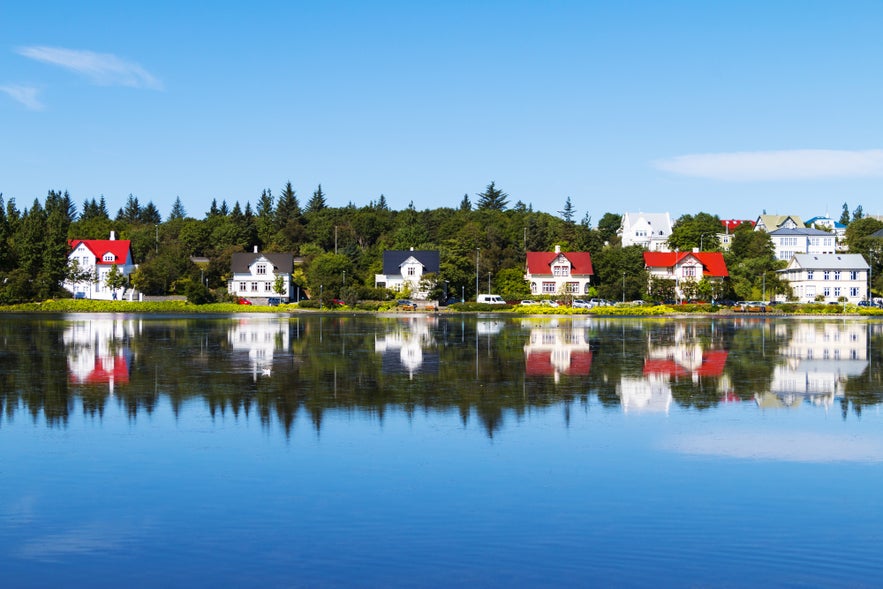
Where can you enjoy recreational activities in Reykjavik parks?
Reykjavik parks cater to all kinds of outdoor activities. At Klambratun, you’ll find sports courts, playgrounds, and open spaces ideal for games and group activities. Laugardalur, the city’s largest park, is packed with amenities, including Iceland’s biggest swimming pool, sports fields, and a botanical garden. For those looking for unique experiences, Nautholsvik geothermal beach allows visitors to swim in warmed seawater, enjoy beach volleyball, or simply relax in the sand.
What are the most peaceful parks in Reykjavik?
For a tranquil experience, Holavallakirkjugardur, a historic cemetery nestled in lush greenery, is an excellent choice for quiet reflection. Hallargardur, located near Tjornin pond, offers a peaceful setting amidst beautiful sculptures and seasonal blossoms. For those who enjoy walking amidst nature, Oskjuhlid forest provides a serene environment with winding trails and a refreshing escape from the city.
Can I see art in Reykjavik’s parks?
Reykjavik’s parks are filled with artistic treasures. Styttugardur Sculpture Garden is a highlight, featuring 26 bronze sculptures by renowned Icelandic artist Einar Jónsson. Gufunes park, known for its quiet charm, also hosts sculptures by Hallsteinn Sigurðsson, many inspired by Norse mythology. Other parks, such as Hljomskalagardur and Austurvollur, feature statues celebrating Iceland’s rich culture and history.
Are parks in Reykjavik suitable for families?
Reykjavik’s parks are fantastic for families. Hljomskalagardur has playgrounds, sandboxes, and open areas perfect for kids to run and play. Laugardalur offers even more family-friendly attractions, including a zoo, a botanical garden, and a massive swimming pool with waterslides and hot tubs. Families will also enjoy exploring Ellidaardalur, where children can spot rabbits and other wildlife.
Can I see the northern lights from Reykjavik’s parks?
Yes, Reykjavik’s parks provide some great spots for northern lights viewing during clear winter nights. Grotta is especially popular due to its low light pollution and stunning coastal views. Oskjuhlid, with its hilltop vantage points, also offers a fantastic place to catch a glimpse of the aurora.
Are parks in Reykjavik free to enter?
All of Reykjavik’s parks are free to enter, making them an excellent option for budget-friendly activities in the city. Whether you want to relax, play, or explore, the city’s parks provide accessible and enjoyable experiences for everyone.
What should I know about Reykjavik parks in summer and winter?
In the summer, Reykjavik’s parks come alive with vibrant greenery and are perfect for enjoying the midnight sun. Locals and visitors alike flock to the parks for picnics, sports, and outdoor events. In winter, these spaces transform into peaceful snow-covered landscapes. Parks like Grotta and Oskjuhlid become prime locations for spotting the Northern Lights, while others offer serene settings for a winter stroll.
How do parks in Reykjavik compare to Iceland’s national parks?
Reykjavik’s parks are urban sanctuaries offering relaxation, recreation, and a taste of Icelandic nature without leaving the city. In contrast, Iceland’s national parks, such as Thingvellir and Vatnajokull, provide vast, dramatic landscapes and opportunities for more adventurous activities like glacier hikes and geyser exploration. Reykjavik’s parks complement these by providing a laid-back, accessible way to enjoy nature within the city.
So whether you’re looking for an area to run around in with the kids, play sports with friends, take a dip in the sea, or learn more about Icelandic art and culture, there is something for everybody at the parks in Reykjavik. Which was your favorite park on this list?
Other interesting articles

The Best Things to Do Near Reykjavik
What are the best things to do and places to see within easy reach of Iceland's capital, Reykjavik? Explore the top attractions you can discover on a day trip from Reykjavik. Book the best Reykjavik t...Read more
The Vegan & Vegetarian Guide to Reykjavik
What are the best options for vegan and vegetarian food in Reykjavik? Is the selection plentiful or limited? Are there restaurants that offer only plant-based food? How vegan-friendly is Reykjavik i...Read more
Top 12 Art Museums and Galleries in Reykjavik
What are the best places to explore the Icelandic art scene and history? Looking for art galleries in Reykjavik or looking to enjoy Icelandic photography? Check out our list of the top 12 top art mu...Read more

Download Iceland’s biggest travel marketplace to your phone to manage your entire trip in one place
Scan this QR code with your phone camera and press the link that appears to add Iceland’s biggest travel marketplace into your pocket. Enter your phone number or email address to receive an SMS or email with the download link.



